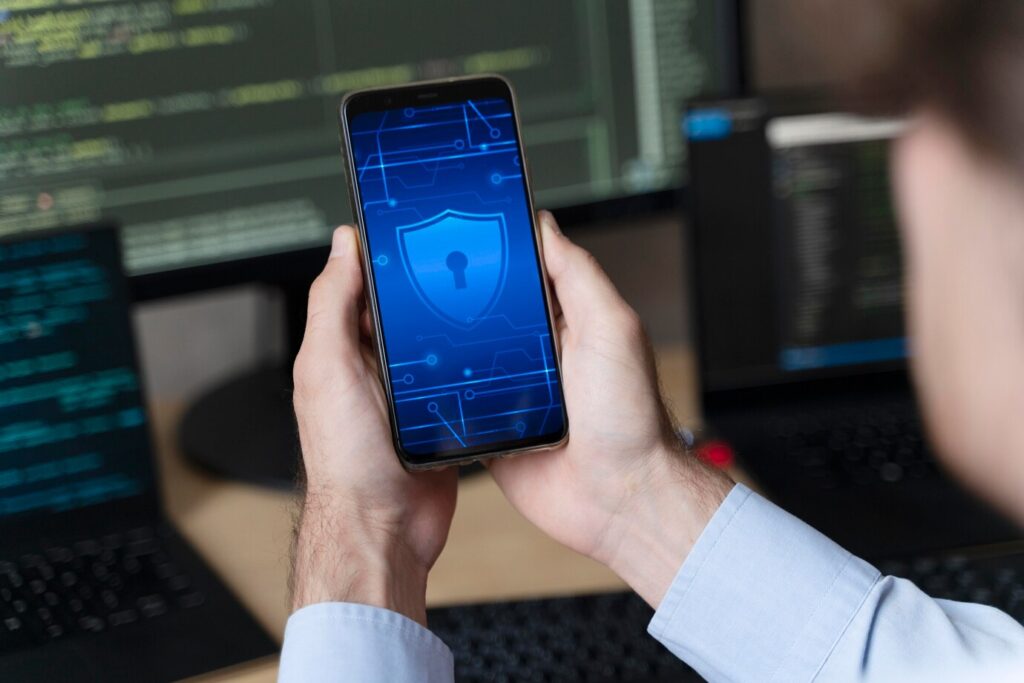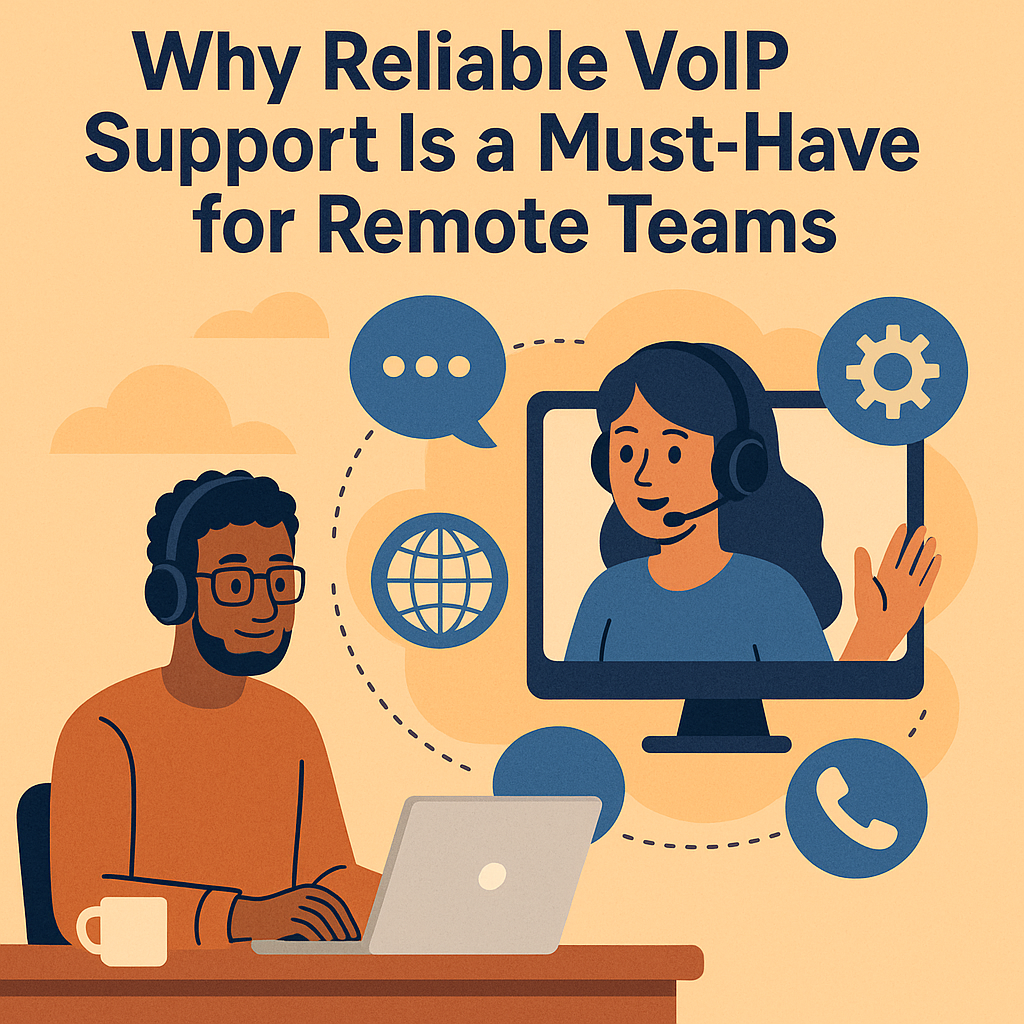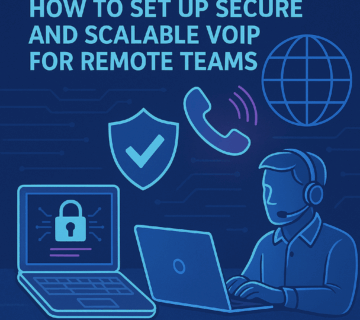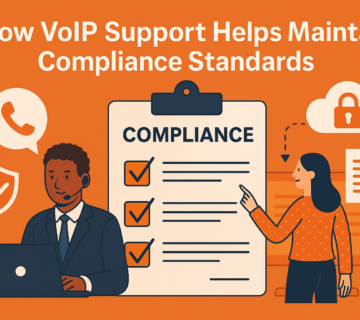VoIP Security: Safeguarding Business Communications from Cyber Threats

While VoIP offers numerous advantages, it also opens up new vulnerabilities that traditional phone systems do not face. Cyber threats like hacking, eavesdropping, and malware can compromise the integrity and confidentiality of business communications if VoIP security is not properly addressed.
In this blog post, we’ll dive into VoIP security, exploring how businesses can protect their communication systems from cyber threats and ensure data privacy.
What is VoIP and Why is Security Critical?
VoIP, short for Voice over Internet Protocol, allows users to make voice calls using a broadband internet connection instead of a traditional phone line. Popular platforms like Zoom, Skype, and Microsoft Teams utilize VoIP technology to facilitate seamless communication between users across the globe. For businesses, VoIP systems have become essential tools for day-to-day operations, providing a cost-effective solution for internal and external communications.
However, since VoIP systems use the internet, they are vulnerable to the same security risks that affect other online systems. Cybercriminals can exploit weaknesses in VoIP networks to intercept calls, steal sensitive data, launch denial-of-service (DoS) attacks, and more. Therefore, ensuring robust VoIP security is vital for businesses to safeguard sensitive conversations, prevent data breaches, and maintain regulatory compliance.
Common Cyber Threats Facing VoIP Systems
Understanding the potential threats targeting VoIP systems is the first step to securing them. Here are some of the most common cyber risks that businesses should be aware of:
1. Eavesdropping
One of the most concerning threats to VoIP systems is eavesdropping. Attackers can intercept unencrypted VoIP traffic, allowing them to listen in on conversations and access sensitive information like personal data, financial details, or confidential business strategies.
2. Denial of Service (DoS) Attacks
A DoS attack occurs when cybercriminals flood a network with excessive traffic, overwhelming the system and causing it to crash. For a business relying on VoIP, a DoS attack can disrupt communication channels, leading to downtime and a loss of productivity.
3. Phishing and Vishing
Phishing is a common tactic where cybercriminals send fraudulent messages to trick recipients into providing sensitive information. When these scams occur over a VoIP system, it’s known as “vishing” (voice phishing). Vishing calls may mimic legitimate businesses to deceive employees into sharing confidential data.
4. Toll Fraud
Toll fraud is a VoIP-specific scam where attackers break into a company’s VoIP system to make unauthorized long-distance calls, potentially racking up hefty phone bills. This not only leads to financial losses but can also tarnish a company’s reputation.
5. Malware and Ransomware
VoIP systems, like other internet-connected technologies, are susceptible to malware and ransomware attacks. Malware can be introduced into the VoIP network through malicious downloads or phishing emails, potentially compromising the entire communication infrastructure.
How to Safeguard Your VoIP System from Cyber Threats
To protect business communications, it’s essential to take proactive steps in securing VoIP systems. Here are some best practices to enhance VoIP security and reduce the risk of cyber attacks:
1. Encrypt VoIP Traffic
Encryption is crucial to prevent eavesdropping and ensure that voice data cannot be intercepted during transmission. Secure Real-time Transport Protocol (SRTP) is commonly used to encrypt VoIP calls, making it much harder for attackers to access conversations.
2. Implement Strong Authentication
Ensure that all users accessing the VoIP system use strong, unique passwords, and enable multi-factor authentication (MFA) for an added layer of security. This makes it more difficult for cybercriminals to gain unauthorized access to the system.
3. Use a Secure VoIP Provider
When selecting a VoIP provider, prioritize security features such as built-in encryption, advanced firewall protection, and real-time monitoring. A reputable provider will also offer regular software updates to address vulnerabilities as they arise.
4. Set Up Firewalls and Session Border Controllers (SBCs)
Firewalls and SBCs are vital in protecting VoIP systems from external threats. Firewalls monitor incoming and outgoing traffic, while SBCs manage the flow of data between the VoIP network and external networks, ensuring only legitimate traffic passes through.
5. Regularly Update VoIP Software
Outdated software is more vulnerable to exploitation. Ensure that all VoIP applications, including hardware, firmware, and softphones, are regularly updated to address any known security vulnerabilities.
6. Monitor and Audit Calls
Continuous monitoring of VoIP traffic can help detect unusual patterns or suspicious activity, enabling businesses to respond quickly to potential threats. Auditing call logs also helps identify toll fraud or other anomalies before they escalate into major issues.
7. Train Employees on VoIP Security
Human mistake is frequently a contributing factor in security breaches. Educate employees on the dangers of phishing and vishing, and provide guidelines on recognizing and avoiding suspicious emails, calls, or links.
The Role of VoIP Security Protocols
To bolster security, businesses should familiarize themselves with various VoIP security protocols designed to protect communications. Some of the key protocols include:
- Secure Real-Time Transport Protocol (SRTP): Provides encryption for voice and video traffic, safeguarding it from eavesdropping and tampering.
- Transport Layer Security (TLS): Ensures secure communication channels between VoIP clients and servers by encrypting signaling messages.
- ZRTP: A protocol that offers end-to-end encryption for VoIP calls, with the added benefit of not requiring pre-shared keys between users.
These protocols, when properly implemented, form the backbone of a secure VoIP environment, protecting both voice data and the infrastructure that supports it.
Why VoIP Security is a Business Priority
The security of a business’s communication system directly impacts its overall operations. A compromised VoIP network can lead to stolen intellectual property, financial losses, and a damaged reputation. In industries like healthcare, finance, and law, where confidential information is exchanged regularly, VoIP security is even more critical due to strict data privacy regulations.
Compliance with frameworks such as the General Data Protection Regulation (GDPR) or the Health Insurance Portability and Accountability Act (HIPAA) necessitates that companies take all necessary measures to secure voice communications. Failing to do so can result in significant legal and financial penalties.
Conclusion: Secure Your VoIP System Today
As businesses continue to adopt VoIP systems, the need for robust security measures becomes increasingly important. Cyber threats targeting VoIP networks are constantly evolving, making it essential for companies to stay ahead of the curve. By implementing encryption, using secure protocols, monitoring traffic, and educating employees, businesses can significantly reduce the risk of cyberattacks and protect their sensitive communications.
Ensuring VoIP security not only protects valuable business data but also strengthens customer trust and helps maintain regulatory compliance. In today’s cyber landscape, safeguarding your VoIP system should be a top priority for businesses of all sizes.
Frequently Asked Questions (FAQs)
- What are the main security threats to VoIP systems? The most common threats include eavesdropping, denial-of-service (DoS) attacks, phishing (vishing), toll fraud, and malware.
- How can businesses protect their VoIP systems from hackers? Implementing encryption, using strong passwords, enabling multi-factor authentication, updating software regularly, and setting up firewalls are all effective ways to protect VoIP systems.
- Why is encryption important for VoIP security? Encryption ensures that voice data is unreadable to unauthorized parties, preventing eavesdropping and protecting sensitive information exchanged over VoIP systems.
- What role do firewalls play in VoIP security? Firewalls monitor and control network traffic, helping to block malicious attacks and unauthorized access to the VoIP system.
- What is toll fraud, and how can it affect businesses? Toll fraud occurs when cybercriminals hack into a VoIP system to make unauthorized long-distance calls, leading to significant financial losses for businesses.
- Are VoIP systems compliant with data privacy regulations? Yes, many VoIP providers offer solutions that comply with data privacy regulations like GDPR and HIPAA, but businesses must also ensure they implement security best practices.




No comment